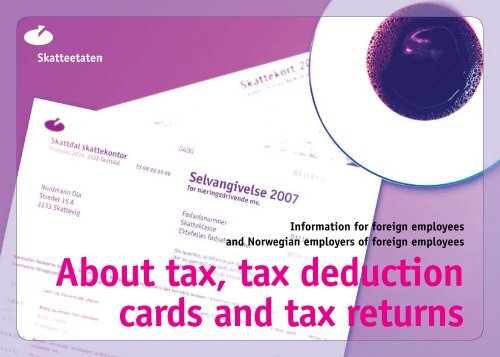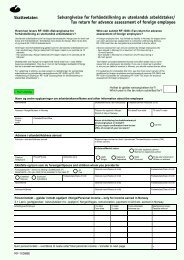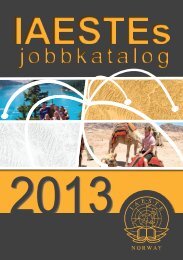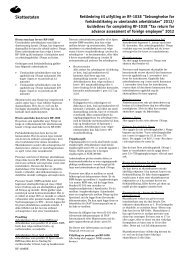Information about tax deduction - Iaeste
Information about tax deduction - Iaeste
Information about tax deduction - Iaeste
Create successful ePaper yourself
Turn your PDF publications into a flip-book with our unique Google optimized e-Paper software.
<strong>Information</strong> for foreign employees<br />
and Norwegian employers of foreign employees<br />
About <strong>tax</strong>, <strong>tax</strong> <strong>deduction</strong><br />
cards and <strong>tax</strong> returns
2<br />
If you are coming to Norway to work for a<br />
Norwegian employer, you must pay <strong>tax</strong> in<br />
Norway on all your earnings in Norway.<br />
After you have arrived in Norway, you must<br />
contact the <strong>tax</strong> office where you live in order<br />
to obtain a <strong>tax</strong> <strong>deduction</strong> card. In Oslo, you can<br />
contact the Service Centre for Foreign Workers,<br />
Hagegata 28, Tøyen. See the brochure “Service<br />
Centre for Foreign Workers”.<br />
The information contained in this brochure is<br />
only intended for those who work in Norway for<br />
a Norwegian employer. It contains information<br />
that you will need when working in Norway.<br />
Obligation to pay <strong>tax</strong> in Norway<br />
The obligation to pay <strong>tax</strong> in Norway follows from Norwegian<br />
<strong>tax</strong> rules. Norway’s right to require you to pay <strong>tax</strong> may be<br />
limited by a <strong>tax</strong> treaty between Norway and your home country.<br />
If you work in Norway for a Norwegian employer, you must<br />
always pay <strong>tax</strong> in Norway on all pay you receive for this work.<br />
The extent of the obligation to pay <strong>tax</strong> depends on how long<br />
you stay in Norway during a 12-month period or a 36-month<br />
period. In explanations of the obligation to pay <strong>tax</strong>, you will<br />
encounter the two terms “limited <strong>tax</strong> liability” and “<strong>tax</strong><br />
resident”.<br />
Limited <strong>tax</strong> liability<br />
If you are “staying temporarily” in Norway, the obligation to<br />
pay <strong>tax</strong> in Norway is limited to pay from your Norwegian<br />
employer for work performed in Norway.<br />
By “staying temporarily” is meant that your stay in Norway<br />
does not exceed<br />
• 183 days during a 12-month period, or<br />
• 270 days in total during a period of 36 months
Tax residence<br />
If you stay so long in Norway that your stay is not temporary<br />
according to the above rules, you will be liable to <strong>tax</strong> in<br />
Norway on all your capital and income pursuant to Norwegian<br />
<strong>tax</strong> rules. You are then “<strong>tax</strong> resident” in Norway. You first<br />
become <strong>tax</strong> resident in Norway from the income year in<br />
which your stay exceeds 183 days. If, for example, you came<br />
to Norway in October 2007 and stay here until June 2008,<br />
you will be treated as having “limited <strong>tax</strong> liability” for 2007<br />
and as “<strong>tax</strong> resident” for 2008.<br />
Tax liability to both Norway and your home country<br />
You may also have to pay <strong>tax</strong> in your home country on<br />
income on which you must pay <strong>tax</strong> in Norway. In order to<br />
avoid double <strong>tax</strong>ation of the same income and capital,<br />
countries enter into <strong>tax</strong> treaties with each other. <strong>Information</strong><br />
<strong>about</strong> whether there is a <strong>tax</strong> treaty between Norway and<br />
your home country and its significance to your liability to<br />
pay <strong>tax</strong> in Norway is available from the <strong>tax</strong> office. Your home<br />
country’s <strong>tax</strong> authorities can also provide you with information<br />
<strong>about</strong> such <strong>tax</strong> treaties.<br />
If you are “<strong>tax</strong> resident” in Norway pursuant to both<br />
Norwegian <strong>tax</strong> rules and the <strong>tax</strong> treaty, you will in principle<br />
pay <strong>tax</strong> in Norway on all the capital and income you have.<br />
If you are “<strong>tax</strong> resident” in Norway pursuant to the Norwegian<br />
<strong>tax</strong> rules, but “<strong>tax</strong> resident” in your home country pursuant<br />
to the <strong>tax</strong> treaty, you will be liable to <strong>tax</strong> in Norway on pay<br />
from your Norwegian employer for work performed in Norway.<br />
Are you an employee or self-employed/engaged<br />
in business?<br />
It is very important in terms of your rights and obligations<br />
in Norway whether you are regarded as an employee or as<br />
self-employed/ engaged in business. If you receive a fixed<br />
wage or pay calculated on the basis of the work you perform,<br />
you are deemed to be an employee. If you have independent<br />
responsibility for the result of the work and your client can<br />
claim compensation for defects in the work, you are selfemployed/<br />
engaged in business.<br />
The <strong>tax</strong> office will consider whether you are an employee or<br />
self-employed/ engaged in business. If you believe that you<br />
are self-employed, you must read the “Miniguide for foreign<br />
companies, self-employed and employees” which is available<br />
from www.skatteetaten.no<br />
In the vast majority of cases, it is easy to decide whether<br />
you are an employee or self-employed/engaged in business.<br />
3
4<br />
When considering whether you are an employee or self- employed/engaged<br />
in business, emphasis is placed on the following factors:<br />
Factors indicating you are self-employed/<br />
engaged in business:<br />
• Have several clients, concurrently or successively<br />
• Receive payment in fixed amounts and not by units<br />
of time<br />
• Provide your own materials<br />
• Have your own operating equipment, e.g. machinery,<br />
tools, car<br />
• Can have other people carry out the work for you<br />
• The client can complain <strong>about</strong> the result<br />
• Are self-employed/engaged in business in your<br />
home country<br />
Factors indicating you are an employee:<br />
• Have an employer<br />
• Are paid by unit of time or by other unit, e.g. per<br />
kilo of strawberries picked (piecework)<br />
• The employer provides all the materials<br />
• The employer provides operating equipment or pays<br />
you extra for the use of your equipment<br />
• You put your own labour at the employer’s disposal<br />
• Cannot have other people carry out the work for you<br />
• The employer has professional and administrative<br />
control of your work<br />
• The employer bears the risk of the result of the work
5<br />
It is the agreement between you and your client and how<br />
you have actually arranged things that decides whether you<br />
are deemed to be an employee or self-employed/engaged in<br />
business. If the conditions for self-employment/being<br />
engaged in business are not fulfilled, you are an employee.<br />
It is important that you clarify as soon as possible whether<br />
you are an employee or self-employed/engaged in business<br />
pursuant to Norwegian <strong>tax</strong> rules. Contact the <strong>tax</strong> office<br />
where you live or Tax Norway West/the Central Tax Office for<br />
Foreign Tax Affairs.<br />
If you are an employee, you have rights that safeguard<br />
your pay and working conditions. You can contact the<br />
Norwegian Labour Inspection Authority in this context,<br />
see www.arbeidstilsynet.no.<br />
Tax <strong>deduction</strong> cards<br />
Everyone who works in Norway must have a <strong>tax</strong> <strong>deduction</strong><br />
card. You hand in your <strong>tax</strong> <strong>deduction</strong> card to your employer.<br />
The <strong>tax</strong> <strong>deduction</strong> card shows how much <strong>tax</strong> your employer<br />
must deduct before paying your wages.<br />
In order to be able to calculate the correct <strong>tax</strong> <strong>deduction</strong>, the<br />
<strong>tax</strong> office must have information <strong>about</strong> how much you reckon<br />
on earning in Norway and how long you intend to stay here.<br />
To obtain a <strong>tax</strong> <strong>deduction</strong> card, you must contact the <strong>tax</strong><br />
office where you live. Take along the following:<br />
1) A valid passport. For nationals of EEA countries and<br />
Switzerland, other identity cards are also accepted that<br />
are approved as travel documents within the EU.<br />
2) A residence or work permit. See below for more information<br />
<strong>about</strong> whether this is required.<br />
3) Your employment contract with your Norwegian employer.<br />
4) Your Norwegian D-number or national identity number,<br />
if you have one.
6<br />
It is also important that you provide the <strong>tax</strong> office with the<br />
address at which you receive mail and that you notify the<br />
<strong>tax</strong> office if you change your address. If you return to your<br />
home country before you have received your <strong>tax</strong> return and/<br />
or <strong>tax</strong> settlement notice, it is important that you inform the<br />
<strong>tax</strong> office and the <strong>tax</strong> collector of your residential address in<br />
your home country.<br />
A <strong>tax</strong> <strong>deduction</strong> card is a document showing how much <strong>tax</strong><br />
your employer must deduct before paying your wages. The<br />
amount your employer deducts is called <strong>tax</strong> withholding or<br />
payroll withholding <strong>tax</strong> and it is a prepayment of the <strong>tax</strong> the<br />
<strong>tax</strong> authorities estimate you will have to pay. The final<br />
stipulation of <strong>tax</strong> takes place in the year following the<br />
income year.<br />
The <strong>tax</strong> <strong>deduction</strong> card is normally valid for one income year<br />
(calendar year). If, for example, you work in Norway from<br />
1 November in one year until 30 March the year after, you<br />
will first be given a <strong>tax</strong> <strong>deduction</strong> card for the months of<br />
November and December and then a new card for the months<br />
of January, February and March.<br />
In December every year, the <strong>tax</strong> authorities distribute <strong>tax</strong><br />
<strong>deduction</strong> cards for the coming year. If you do not receive a<br />
new <strong>tax</strong> <strong>deduction</strong> card by 1 January, you must contact the<br />
<strong>tax</strong> authorities and request one.<br />
You must hand in your <strong>tax</strong> <strong>deduction</strong> card to your employer<br />
yourself. Your employer cannot deduct less <strong>tax</strong> than stated<br />
on the <strong>tax</strong> <strong>deduction</strong> card. If you do not hand in your <strong>tax</strong><br />
<strong>deduction</strong> card to your employer, your employer must deduct<br />
50 per cent of your income. The employer pays the <strong>tax</strong> to<br />
the authorities. Any excess <strong>tax</strong> that has been paid will be<br />
refunded when your <strong>tax</strong> return has been processed and the<br />
<strong>tax</strong> assessed.<br />
If you have been granted a work permit until a specific date,<br />
this will be stated on your <strong>tax</strong> <strong>deduction</strong> card. If you<br />
subsequently extend your work permit, you will not have to<br />
request a new <strong>tax</strong> <strong>deduction</strong> card, however. It is sufficient<br />
that you give your employer documentation that the work<br />
permit has been extended.
7<br />
How is the <strong>tax</strong> withholding decided?<br />
If you have filled in the form “Application for a <strong>tax</strong> <strong>deduction</strong><br />
card for foreign citizens” (RF-1209), your <strong>tax</strong> withholding<br />
will be calculated on the basis of the information you<br />
provided in the form. Otherwise, the <strong>tax</strong> authorities must<br />
stipulate the <strong>tax</strong> withholding on the basis of the information<br />
at their disposal, or estimate what the amount should be.<br />
The <strong>tax</strong> rates for the individual year are stipulated by the<br />
Norwegian parliament, the Storting.<br />
You must hand in Part 1 of your <strong>tax</strong> <strong>deduction</strong> card to your<br />
main employer. If you change jobs during the income year,<br />
your employer should return your <strong>tax</strong> <strong>deduction</strong> card to you<br />
(signed) so that you can give it to your new employer. You<br />
can give Part 2 to any other employers you work for. You<br />
keep Part 3 yourself.<br />
Employees are usually given a table-based <strong>tax</strong> <strong>deduction</strong> card.<br />
If you claim the standard <strong>deduction</strong> for foreign employees,<br />
you will be issued specially prepared tables in which this has<br />
been taken into account. They are numbered 7300 or higher.<br />
Read <strong>about</strong> the standard <strong>deduction</strong> in the brochure “Standard<br />
<strong>deduction</strong>s”.<br />
A percentage-based card is issued if a table-based card<br />
would not result in the correct <strong>tax</strong> <strong>deduction</strong>. It consists of<br />
three parts, but has the same percentage rate in Parts 1 and<br />
2. Your employer will in such case calculate the <strong>tax</strong> withholding<br />
at the percentage rated stated.<br />
What do I do if I think my <strong>tax</strong> <strong>deduction</strong> card<br />
results in the <strong>tax</strong> withholding being incorrect?<br />
Perhaps you have a different <strong>tax</strong> withholding than colleagues<br />
in the same situation as you? If you want to find<br />
out whether your <strong>tax</strong> <strong>deduction</strong> card is incorrect, you can<br />
apply to change the card. You can fill in the form “Application<br />
for a <strong>tax</strong> <strong>deduction</strong> card for foreign citizens” (RF-1209)<br />
again, providing any new information, or use the form<br />
“Application for new or changed <strong>tax</strong> card/advance <strong>tax</strong> 2008”,<br />
which you can obtain from the <strong>tax</strong> authorities or from<br />
skatteetaten.no.
8<br />
National identity number or D-number<br />
When you apply for a <strong>tax</strong> <strong>deduction</strong> card for the first time<br />
you are given a registration number: a D-number or national<br />
identity number. The number is stated on your <strong>tax</strong> <strong>deduction</strong><br />
card and is used to identify you to the authorities. When you<br />
open a bank account in Norway, you must give this number<br />
to the bank. You should have a bank account in Norway into<br />
which your employer can pay your wages and to which the<br />
authorities can later transfer any excess <strong>tax</strong> deducted.<br />
You must use the D-number or national identity number<br />
every time you come to Norway to work. You must also state<br />
the number when applying for a new <strong>tax</strong> <strong>deduction</strong> card.<br />
In Norway, national identity numbers and D-numbers are<br />
used extensively to identify inhabitants and in order to<br />
ensure that the authorities can identify individual inhabitants<br />
with certainty.<br />
Everyone who resides in Norway is therefore assigned a<br />
unique national identity number that follows them throughout<br />
their lives. The national identity number consists of<br />
11 digits, the first six of which consist of the person’s<br />
date of birth.<br />
Foreign nationals who come to Norway to work temporarily<br />
are not given a national identity number. Instead, they are<br />
given a so-called D-number. These numbers are similar in<br />
structure to national identity numbers, but the first digit is<br />
increased by four.<br />
If you have not previously been given a D-number, you will<br />
be assigned a D-number when you request a <strong>tax</strong> <strong>deduction</strong><br />
card. You must present ID (passport or similar). Once you<br />
have a D-number, you will use the same number in all<br />
contexts where your national identity number or D-number is<br />
requested. If, for example, you open a bank account, you<br />
must state your D-number to the bank. It is important that<br />
you use the same D-number every time you come to Norway<br />
to work.<br />
If you are going to stay in Norway for so long that you are<br />
deemed to be resident here pursuant to the Act relating to<br />
the National Population Register, you will be assigned a<br />
national identity number. If you have previously been<br />
assigned a D-number, you will only use the national identity<br />
number thereafter.
National Insurance contributions<br />
If you are a member of the Norwegian National Insurance<br />
scheme, you must pay national insurance contributions. Your<br />
National Insurance contribution is deducted from your pay as<br />
part of the <strong>tax</strong> withholding.<br />
If you are a member of the national insurance scheme in your<br />
home country, you will not pay national insurance contributions<br />
in Norway. Contact the NAV (Norwegian Labour and Welfare<br />
Service) office in the municipality in which you live and submit<br />
form E 101 from the authorities in your home country. You will<br />
receive confirmation form the NAV office which you can submit<br />
to the <strong>tax</strong> office. Your <strong>tax</strong> withholding will then be reduced.<br />
You must also give your employer a copy of the confirmation<br />
from the NAV office.<br />
More information <strong>about</strong> National Insurance in Norway is<br />
available at www.nav.no<br />
Pay slips<br />
When your employer pays you your wages, you will also<br />
receive a receipt (pay slip), which shows your gross pay<br />
and how much <strong>tax</strong> has been deducted. Keep these receipts.<br />
They document how much <strong>tax</strong> you have paid.<br />
Tax returns<br />
Everyone who works in Norway must submit a <strong>tax</strong> return.<br />
It must be submitted to the <strong>tax</strong> office by 30 April in the year<br />
following the income year.<br />
You will receive your <strong>tax</strong> return at the end of March/<br />
beginning of April. If you do not receive a <strong>tax</strong> return, you<br />
must contact the <strong>tax</strong> office. It is important that the <strong>tax</strong><br />
assessment office knows where to send the <strong>tax</strong> return.<br />
If the <strong>tax</strong> return is pre-completed and contains information from,<br />
among others, your employer, you must check that the information<br />
is the same as that contained in the Certificate of Pay and<br />
Tax Deducted which you receive from your employer in January. If<br />
it is incorrect, you must correct the information in the <strong>tax</strong> return.<br />
Please note that you may be entitled to <strong>deduction</strong>s in your<br />
<strong>tax</strong> return, e.g. the standard <strong>deduction</strong> for foreign nationals<br />
or a <strong>deduction</strong> for expenses relating to living away from your<br />
home in your home country (<strong>deduction</strong> for commuters). You<br />
must claim these <strong>deduction</strong>s yourself by entering them in<br />
your <strong>tax</strong> return. More information <strong>about</strong> standard <strong>deduction</strong>s<br />
is available in <strong>Information</strong> for foreign employees: Standard<br />
<strong>deduction</strong>s, and <strong>about</strong> <strong>deduction</strong>s for commuters in <strong>Information</strong><br />
to foreign employees: Deductions for commuters.<br />
9
10<br />
If you are resident in another EEA state and have limited <strong>tax</strong><br />
liability to Norway, you can be granted an extended right to<br />
<strong>deduction</strong>s if at least 90 per cent of your income is liable to<br />
<strong>tax</strong> in Norway. More information <strong>about</strong> <strong>tax</strong> returns is available<br />
in “The <strong>tax</strong> return – checking – changing – submission”.<br />
What obligations do I have when I am liable to<br />
<strong>tax</strong> in Norway?<br />
• You are obliged to provide the <strong>tax</strong> authorities with<br />
information <strong>about</strong> your income, capital and <strong>deduction</strong>s.<br />
• The information is provided in the <strong>tax</strong> return, which is a<br />
form everyone who is liable to <strong>tax</strong> in Norway must submit<br />
once a year.<br />
• If you have not received a <strong>tax</strong> return form, you must<br />
contact the <strong>tax</strong> authorities.<br />
• You are responsible for the correctness of the information<br />
you provide. This applies even if the information in the <strong>tax</strong><br />
return you receive is completed in advance.<br />
• If you are “<strong>tax</strong> resident” in Norway pursuant to Norwegian<br />
domestic rules, but “<strong>tax</strong> resident” in another country<br />
pursuant to a <strong>tax</strong> treaty, you are nonetheless obliged to<br />
submit a <strong>tax</strong> return to the Norwegian <strong>tax</strong> authorities.<br />
What rights do I have?<br />
• The <strong>tax</strong> authorities are obliged to provide guidance in<br />
connection with the completion of forms and <strong>about</strong> the<br />
rules that apply to you.<br />
• You can request to see case documents concerning your<br />
<strong>tax</strong> assessment.<br />
• You can be represented by a proxy. You must give the<br />
person written authorisation.<br />
• If the <strong>tax</strong> authorities are considering changing amounts<br />
you have entered in your <strong>tax</strong> return or changing a completed<br />
case (after you have received your <strong>tax</strong> settlement<br />
notice), they must give you notice of this and set a<br />
deadline for you to respond.<br />
• If the case concerns additional <strong>tax</strong> or a change in your<br />
<strong>tax</strong>ation, you will be sent a decision in writing.
11<br />
Where does the pre-completed information in<br />
the <strong>tax</strong> return come from?<br />
Tax Norway receives information from a number of sources.<br />
Employers are the most important source. They are obliged<br />
to deduct <strong>tax</strong>, pay it and provide information to Tax Norway.<br />
After the end of the income year (calendar year), your<br />
employer must send an annual statement detailing your<br />
pay and <strong>tax</strong> deducted in the income year (Certificate of Pay<br />
and Tax Deducted), both to you and the <strong>tax</strong> authorities.<br />
Banks are also obliged to provide information.<br />
If you have received a provisional <strong>tax</strong> assessment together<br />
with your <strong>tax</strong> return that shows that you have paid too little<br />
<strong>tax</strong>, you can avoid paying interest on the outstanding <strong>tax</strong> if<br />
you pay it before 30 April. You will receive a giro for the<br />
payment of <strong>tax</strong> along with your <strong>tax</strong> return. Please note that,<br />
if you change the income or <strong>deduction</strong> amounts in your <strong>tax</strong><br />
return, the total amount of <strong>tax</strong> will also change.<br />
What do I do when I receive my <strong>tax</strong> return?<br />
You must check that the pre-completed information is<br />
correct and ensure that the return is submitted by the<br />
deadline. You can choose whether you wish to send it by<br />
mail or via the internet. If you send your <strong>tax</strong> return on<br />
paper, you will find the address of the <strong>tax</strong> authorities on<br />
the top left-hand corner of the first page.
12<br />
What happens if I do not submit a <strong>tax</strong> return?<br />
If you fail to submit a <strong>tax</strong> return, the <strong>tax</strong> authorities will<br />
have to stipulate your income by discretionary judgement.<br />
In such case, Tax Norway will take into consideration the<br />
information it has <strong>about</strong> you. The Certificate of Pay and Tax<br />
Deducted from your employer is one source. But you risk<br />
information being missing <strong>about</strong> some of the <strong>deduction</strong>s to<br />
which you are entitled and you will not be granted <strong>deduction</strong>s<br />
which you have to claim yourself. You will also have to pay<br />
additional <strong>tax</strong>. This comes in addition to ordinary <strong>tax</strong>.<br />
How is the <strong>tax</strong> calculated?<br />
There are two bases for calculating <strong>tax</strong>.<br />
• Personal income (gross pay and <strong>tax</strong>able benefits and<br />
allowances from your employer). Sur<strong>tax</strong> to the state is<br />
calculated on this basis. The basic <strong>tax</strong>-free allowance for<br />
the calculation of sur<strong>tax</strong> is so high that many <strong>tax</strong>payers do<br />
not pay sur<strong>tax</strong>. National Insurance contributions are also<br />
calculated on the basis of personal income.<br />
• Ordinary income (gross income minus <strong>deduction</strong>s from<br />
income). Tax to municipal and county authorities and<br />
equalisation <strong>tax</strong> to the state is calculated on the basis of<br />
ordinary income. The basic <strong>tax</strong>-free allowance for ordinary<br />
income is called personal allowance.<br />
If you stay in Norway for the whole income year, you will be<br />
given a full minimum <strong>deduction</strong> and personal allowance<br />
(12/12). If you only stay in Norway for part of the income<br />
year, the <strong>deduction</strong>s and allowances will be reduced in<br />
proportion to how long you have stayed in Norway. If, for<br />
example, you stayed in Norway for between three and four<br />
months in the income year, the allowances and <strong>deduction</strong>s<br />
will be 4/12 of the full amounts.
13<br />
Example of what the <strong>tax</strong> will be for an employee who stays in Norway temporarily.<br />
Your <strong>tax</strong> depends on how much income you earn and on how long you stay here.<br />
The following is an example for an employee who stayed here to work for five months (less than 183 days) in 2007:<br />
Example:<br />
Work in Norway for 20 weeks of 40 hours at NOK 120 per hour = NOK 96 000<br />
100 hours’ overtime at NOK 180 = NOK 18 000<br />
Total pay NOK 114 000<br />
Holiday pay: 10.2% of NOK 114,000 = NOK 11 628<br />
Total <strong>tax</strong>able income in Norway NOK 125 628 NOK 125 628<br />
Minimum <strong>deduction</strong>: 36% of 125,600 = NOK 45,216, but maximum 5/12 of 63,800 = NOK 26 583<br />
Standard <strong>deduction</strong> for foreign nationals: 10% of NOK 125,600 = NOK 12 560<br />
Total <strong>deduction</strong>s NOK 39 143 NOK 39 143<br />
Ordinary income is thus NOK 124,628 – NOK 39,143 = NOK 86 485<br />
Total <strong>tax</strong><br />
Sur<strong>tax</strong> – income under the limit of 5/12 of NOK 400,000 NOK 0<br />
Tax on ordinary income is calculated on NOK 86 485<br />
Reduced by 5/12 of the personal allowance in class 1: NOK 37,000 = NOK 15 417<br />
28% <strong>tax</strong> is calculated on NOK 71 068<br />
The total <strong>tax</strong> is NOK 19 899<br />
National Insurance contributions of 7.8% of NOK 125,628 come in addition = NOK 9 799<br />
Total <strong>tax</strong> and National Insurance contributions NOK 29 698
14<br />
Tax settlement notice<br />
Once the <strong>tax</strong> office has processed your <strong>tax</strong> return, you will<br />
receive a <strong>tax</strong> settlement notice. It contains information<br />
<strong>about</strong> the income on which <strong>tax</strong> has been calculated, how<br />
much <strong>tax</strong> your employer has deducted and whether you have<br />
paid too much or too little <strong>tax</strong>. The <strong>tax</strong> settlement notice<br />
arrives in either June or October in the year following the<br />
income year.<br />
If you have paid too little <strong>tax</strong>, you must pay the outstanding<br />
amount within the deadline stated on the giro that accompanies<br />
the <strong>tax</strong> settlement notice. You must pay within the<br />
deadline even if you appeal against the <strong>tax</strong> settlement. If<br />
your payment is overdue, interest will be charged at the rate<br />
for overdue payments. If you do not pay the <strong>tax</strong>, the<br />
authorities will pursue the matter and order your employer<br />
to make <strong>deduction</strong>s from your pay if you are still working in<br />
Norway. If you have assets in Norway, the authorities may<br />
establish a charge on them. The authorities abroad also<br />
assist the Norwegian authorities in connection with the<br />
collection of unpaid <strong>tax</strong>.<br />
Appeals<br />
If you believe that your <strong>tax</strong> settlement is incorrect, you can<br />
appeal. If you receive your <strong>tax</strong> settlement notice in June,<br />
the deadline for appealing is 10 August. If you receive your<br />
<strong>tax</strong> settlement notice in October, the deadline is three weeks<br />
after the <strong>tax</strong> settlement notice was sent. Appeals must be<br />
sent to the <strong>tax</strong> office. The name and address are stated on<br />
the <strong>tax</strong> settlement notice. In an appeal, you must state what<br />
you believe is incorrect and why it is incorrect. If it is<br />
incorrect, you will receive a new <strong>tax</strong> settlement notice. You<br />
will receive a refund of any excess <strong>tax</strong> paid.<br />
The appeal will be sent to the <strong>tax</strong> collector if you believe<br />
the payroll withholding <strong>tax</strong> is incorrect.<br />
If you have been <strong>tax</strong>ed on the same income in your home<br />
country, you must contact the <strong>tax</strong> authorities there in order<br />
to find out how to avoid double <strong>tax</strong>ation.
15<br />
Advance <strong>tax</strong> assessment<br />
If you stay in Norway for up to 183 days, you can ask to<br />
settle your <strong>tax</strong> before leaving Norway. Contact the <strong>tax</strong> office,<br />
ask for an advance <strong>tax</strong> assessment and state when you are<br />
due to leave the country.<br />
You must complete a <strong>tax</strong> return form and bring along<br />
confirmation from your employer of:<br />
• your gross pay in Norway<br />
• any allowances paid by your employer<br />
• how much <strong>tax</strong> you have paid<br />
The <strong>tax</strong> office will work out how much <strong>tax</strong> you have to pay, and<br />
you will receive a <strong>tax</strong> settlement notice shortly afterwards.
Published by<br />
Tax Norway<br />
March 2008<br />
Print run<br />
15,000<br />
Graphic design<br />
Blå Design<br />
Printed by<br />
Jan Erik Lundahl<br />
RF-2051<br />
skatteetaten.no












